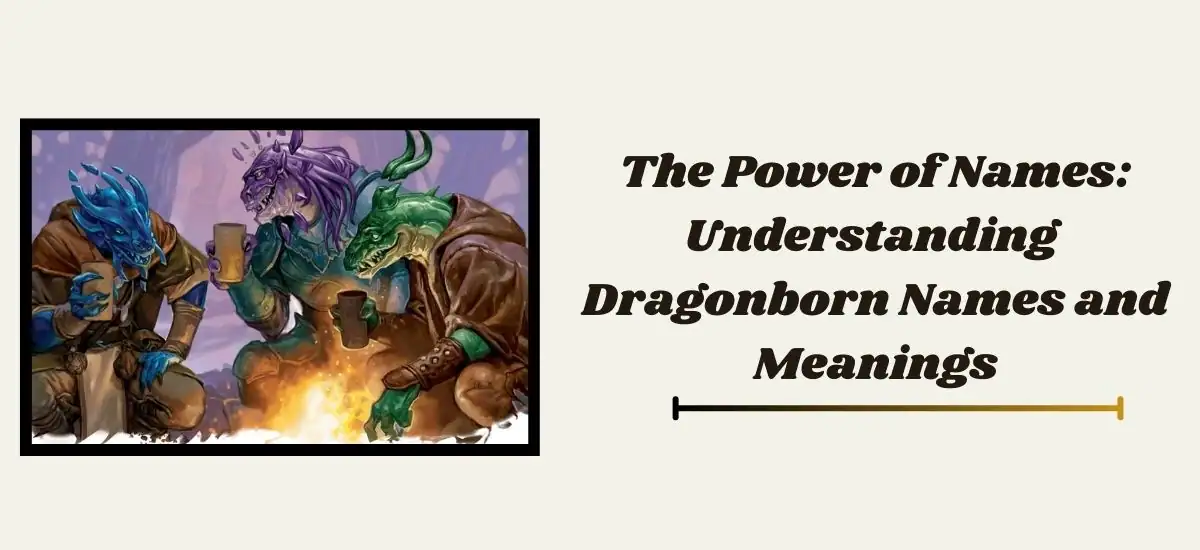“Dragonborn names, celebrated in fantasy and role-playing games like Dungeons & Dragons, are steeped in rich meanings and history. These names distinguish characters and open a gateway to understanding the deep cultural layers woven into their lore. By exploring the origins and significance of these names, we gain a deeper appreciation of their role in the mystical world of Dragonborn.”
The Origin of Dragonborn Names
The Fantasy Roots
Dragonborn, as envisioned in the lore of Dungeons & Dragons, hail from a proud lineage of dragons, reflected in their names which are often drawn from draconic language, a fictional language crafted to add depth and authenticity to this fantastical race. These names aren’t just random syllables but are imbued with power and history, echoing the grandeur of their legendary ancestors.
Cultural Significance
- Mythical Inspiration: The concept of Dragonborn draws heavily from various myths where creatures that are half-human, half-dragon appear as powerful beings.
- Role in Stories: In tales and games, Dragonborn hold roles of warriors, mages, or noble heroes, with names that often connote strength, honor, or mystical abilities.
Male Dragonborn Names
- Torinn
- Faylen
- Zephyros
- Arjhan
- Balasar
- Kriv
- Medrash
- Ghesh
- Rhegar
- Sarram
- Mehen
- Nadarr
- Pandjed
- Tarhun
- Verthica
- Akmenos
- Bharash
- Donaar
- Ixen
- Kepeshkmolik
Understanding the Meanings Behind Dragonborn Names
Dragonborn names are not just fanciful concoctions but have meanings that reflect the character’s heritage and the traits valued by their cultures. Decoding these names can add an extra layer of character development and storytelling.
Common Elements in Names
- Prefixes and Suffixes: Names like ‘Thava-with’ where ‘Thava’ could mean guardian, and ‘mith’ might mean secret. This structure shows how their names often combine elements of power and mystery.
- Meanings: Each segment of a name can often stand alone as a word in the draconic language, contributing to a meaningful descriptor of the bearer.
Examples of Names and Meanings
- Arjhan: Derived from draconic words meaning “leader” or “first,” this name is often borne by those destined for command.
- Balasar: Often translated to “the strong,” indicating a character of formidable strength and valor.
Female Dragonborn Names
- Kava
- Shirin
- Shava
- Thava
- Jhank
- Daar
- Myastan
- Yrjixtilex
- Vezera
- Felsa
- Orilys
- Sora
- Surina
- Biri
- Tostyn
- Usae
- Vola
- Azzara
- Katra
- Lorana
Choosing a Dragonborn Name for Your Character
Selecting a name for a Dragonborn character is a creative process that requires understanding the interplay between names and narrative roles. A well-chosen name can significantly enhance the player’s connection to the character and enrich the gaming experience.
Tips for Choosing Names
- Reflect Character Traits: If your Dragonborn is fierce and brave, consider names like ‘Ghesh’—meaning “warrior”.
- Consider Role in Story: For a wise advisor or scholar, a name like ‘Medrash’ meaning “learned” could be perfect.
Incorporating Name Meanings in Gameplay
- Backstory: Use the name’s meaning to shape your character’s backstory. For instance, ‘Sora’ meaning “sky” could be a Dragonborn who is always looking to the horizon, searching for new quests.
- Role-playing: Let the name guide your decisions in gameplay; a Dragonborn named ‘Kriv’, implying “judge”, should be a natural at making law or ruling decisions.
This structured approach to the first three sections should make the content visually appealing, engaging, and informative, complete with bullet points, short paragraphs, and a clear exploration of the Dragonborn names. If this aligns with your expectations, let me know, and I’ll continue with the remaining sections.
Top Dragonborn Names and Their Rich Meanings
Exploring some of the most popular Dragonborn names can provide inspiration for naming characters or understanding the nuances of Dragonborn lore better. Here’s a look at a few top names and their profound meanings:
Male Dragonborn Names
- Torinn: Often translates to “thunder”, symbolizing strength and a commanding presence. Ideal for a warrior or a leader.
- Faylen: Means “flying star”, suggesting speed and ambition, suitable for scouts or adventurers.
Female Dragonborn Names
- Kava: Signifies “fiery”, perfect for a fierce warrior or a passionate leader.
- Shirin: Means “child of the storm”, fitting for a character with a tumultuous background or powerful abilities.
Each name not only tells a story but also reflects the cultural depth and persona of the Dragonborn bearing it.
Dragonborn Clan Names
- Strakeln
- Drachedandion
- Thordrin
- Yarjerit
- Vendraxis
- Crethik
- Qhaniron
- Ophinshtalajiir
- Ghaalixir
- Dhakanni
- Korthik
- Zorvarax
- Vythica
- Srindin
- Traxigor
- Omrax
- Urthix
- Fyraan
- Nymbrixion
- Jaxar
How Dragonborn Names Enhance Gameplay and Storytelling
Dragonborn names do more than identify a character; they add richness to the gameplay and storytelling, making the fantasy world more immersive and engaging.
Enhancing Role-Playing
- Identity and Heritage: Names root characters in their world, giving players cues about their identity, heritage, and the societal values of Dragonborn.
- Decision Making: Knowing the meaning behind a name can influence a player’s decisions and interactions, aligning with the traits their name embodies.
Storytelling Integration
- Character Development: Authors and game masters can use names to foreshadow a character’s fate or reveal hidden traits.
- Plot Elements: Names can be central to plotlines, with quests or secrets tied to the meaning of a Dragonborn’s name.
Creative Uses of Dragonborn Names in Game Design
The application of Dragonborn names goes beyond character creation, serving as a tool for game designers to craft a more vivid and cohesive world.
Enhancing World-Building
- Naming Conventions: Establishing consistent naming conventions based on Dragonborn language can help create a sense of realism and depth in the game world.
- Cultural Significance: Names can reflect the geography, history, and culture of different Dragonborn clans or regions within the game, providing a richer background for storytelling.
Examples of Naming Conventions and Their Cultural Implications
| Name | Meaning | Cultural Implication |
| Varmyr | “Protector of the sky” | Reflects a clan that worships celestial bodies. |
| Jaxar | “Born of fire” | Indicates a lineage known for its ferocity and valor in battle. |
Role of Dragonborn Names in Community Engagement
Dragonborn names also play a pivotal role in player communities, fostering engagement and identity among members.
Community Building
- Identity and Belonging: Players often adopt their Dragonborn names in forums and multiplayer games, creating personas that extend beyond the game.
- Events and Competitions: Naming contests, lore discussions, and role-playing events often revolve around the exploration of Dragonborn names and their meanings.
Enhancing Interaction
- Storytelling Competitions: Encouraging players to create stories based on their character’s name can lead to deeper engagement.
- Role-Playing Sessions: Names can serve as a springboard for role-playing scenarios, where players embody the traits and backstory associated with their Dragonborn’s name.
Tools and Resources for Discovering and Creating Dragonborn Names
To assist players and creators, several tools and resources can be used to generate and understand Dragonborn names.
Online Name Generators
- Dragonborn Name Generator Tools: These tools offer randomized, culturally accurate names based on user-defined criteria such as clan, gender, and desired traits.
- Linguistic Databases: Websites detailing draconic language and its syntax can help players create names that are linguistically consistent.
Books and Guides
- Role-Playing Game Manuals: Manuals often contain sections dedicated to name generation, complete with cultural backgrounds and naming guidelines.
- Fantasy Linguistics Books: Books that explore the construction of languages in fantasy settings can provide insights into creating meaningful and coherent names.
Conclusion
Exploring Dragonborn names is more than a creative exercise; it’s a journey into the heart of fantasy storytelling and community building. These names carry the weight of history, culture, and personal identity, enriching the gaming experience and fostering a deeper connection to the fantastical worlds they inhabit.
FAQs About Dragonborn Names and Meanings
- What is the origin of Dragonborn names?
- Dragonborn names often originate from draconic language, a fictional construct used in fantasy settings. These names are typically influenced by the character’s traits, clan histories, and the dragon lore within the game or story.
- How do Dragonborn names reflect character traits?
- Names are usually chosen based on the traits or destiny of the character. For example, names might translate to words like “leader,” “fierce,” or “honorable,” indicating the role or personality of the Dragonborn.
- Are there specific conventions or rules for creating Dragonborn names?
- Yes, Dragonborn names typically follow specific linguistic rules, such as combining a prefix and suffix that each have meanings, contributing to a full name that reflects both personal and clan characteristics.
- Can I create my own Dragonborn name and what should I consider?
- Absolutely! Consider the character’s backstory, traits, and the type of dragon they descend from. Combining elements of draconic language that represent these factors can help create a meaningful and authentic name.
- What are some examples of popular Dragonborn names and their meanings?
- Examples include “Arjhan” (leader), “Balasar” (the strong one), and “Shirin” (child of the storm), each reflecting different aspects of strength, leadership, or elemental power.
Related Posts:-


Leave a Reply
You must be logged in to post a comment.